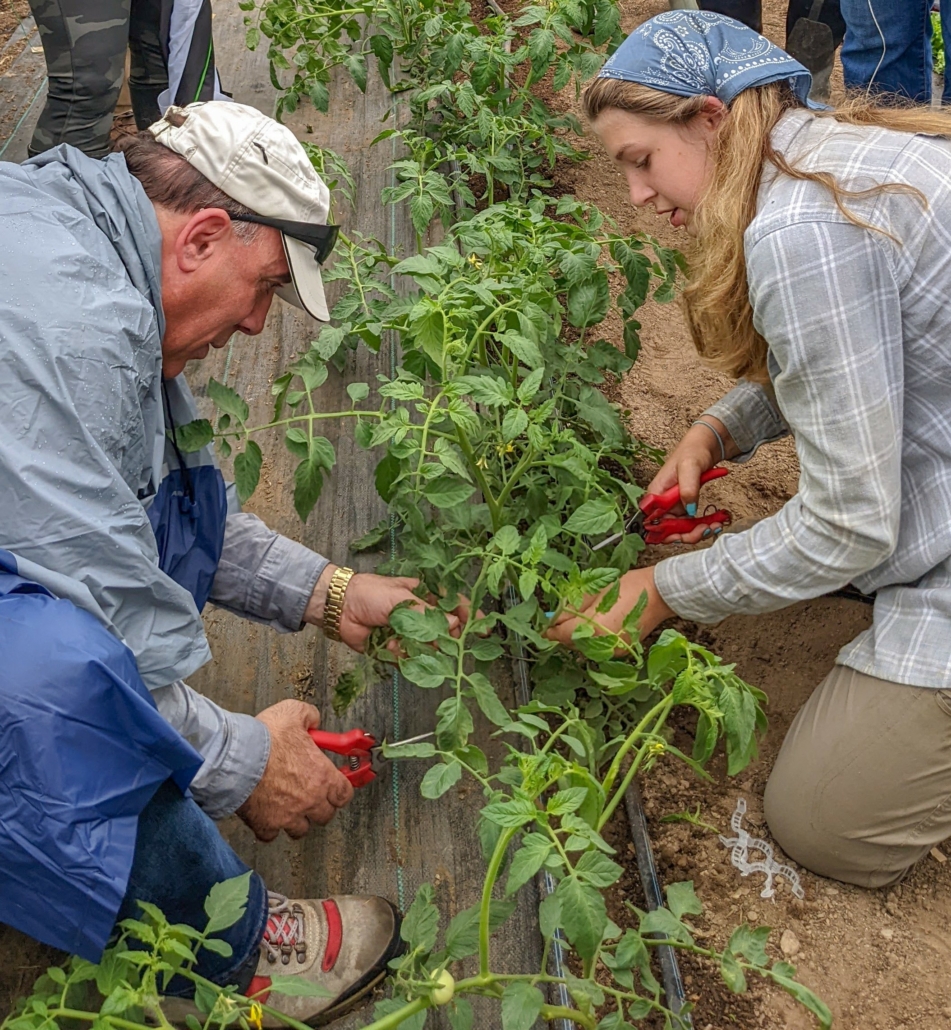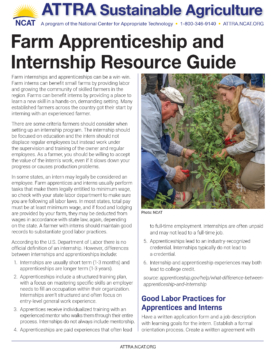Farm Apprenticeship and Internship Resource Guide

Photo: NCAT
By Lee Rinehart, NCAT Agriculture Specialist
Farm internships and apprenticeships can be a win-win. Farm interns can benefit small farms by providing labor and growing the community of skilled farmers in the region. Farms can benefit interns by providing a place to learn a new skill in a hands-on, demanding setting. Many established farmers across the country got their start by interning with an experienced farmer.
There are some criteria farmers should consider when setting up an internship program. The internship should be focused on education and the intern should not displace regular employees but instead work under the supervision and training of the owner and regular employees. As a farmer, you should be willing to accept the value of the intern’s work, even if it slows down your progress or causes production problems.
In some states, an intern may legally be considered an employee. Farm apprentices and interns usually perform tasks that make them legally entitled to minimum wage, so check with your state labor department to make sure you are following all labor laws. In most states, total pay must be at least minimum wage, and if food and lodging are provided by your farm, they may be deducted from wages in accordance with state law, again, depending on the state. A farmer with interns should maintain good records to substantiate good labor practices.
According to the U.S. Department of Labor there is no official definition of an internship. However, differences between internships and apprenticeships include:
- Internships are usually short term (1-3 months) and apprenticeships are longer term (1-3 years).
- Apprenticeships include a structured training plan, with a focus on mastering specific skills an employer needs to fill an occupation within their organization.
Internships aren’t structured and often focus on entry-level general work experience. - Apprentices receive individualized training with an experienced mentor who walks them through their entire process. Internships do not always include mentorship.
- Apprenticeships are paid experiences that often lead to full-time employment. Internships are often unpaid and may not lead to a full-time job.
- Apprenticeships lead to an industry-recognized credential. Internships typically do not lead to a credential.
- Internship and apprenticeship experiences may both lead to college credit.
Good Labor Practices for Apprentices and Interns
Have a written application form and a job description with learning goals for the intern. Establish a formal orientation process. Create a written agreement with duties, expectations, probationary period, farm rules, and stipends (including housing and food shares, if appropriate, as well as bonuses for completing the season).
Apprentices should be included in farm planning as part of their education, and regular meetings should be scheduled to go over daily and weekly tasks and learning outcomes. Farmers should work alongside the apprentice and provide hands-on demonstrations and explanations of why a task is important and how to accomplish it. Many farmers also encourage interns to attend other farming events and make time available for them to do so as part of their learning.
Through farm apprenticeship programs, farmers have a unique opportunity to impact the future of agriculture. Farmers can provide young people not only with technical and business experience but also with vision, imagination, and a community-based ethic. Farm-based learning is one of the ways we can ensure small farm viability, strengthen movements toward food sovereignty, and engage communities in food democracy.
The information above was adapted from MacAuley, Lorien E. No date. Farm Internships & Apprenticeships: The Basics. Virginia Beginning Farmer and Rancher Coalition and Virginia Tech Agricultural, Leadership, and Community Education.
Further Resources
Positive Practices in Labor Management, California Institute for Rural Studies and the National Center for Appropriate Technology
Ag Apprenticeship Toolkit, Ag Apprenticeship Learning Network
Farmers’ Guide to Farm Internships, Farmers’ Legal Action Group
Farm Apprenticeships, Community Involved in Sustaining Agriculture (CISA)
- Apprenticeship
- Registered Apprenticeships
- Fact Sheet #71: Internship Programs Under The Fair Labor Standards Act
Farm Apprenticeship and Internship Resource Guide
By Lee Rinehart, NCAT Agriculture
Specialist
Published April 2023
©NCAT
IP641, Slot 680
This publication is produced by the National Center for Appropriate Technology through the ATTRA Sustainable Agriculture program, under a cooperative agreement with USDA Rural Development. ATTRA.NCAT.ORG. This publication was also made possible in part by funding from the USDA’s National Institute of Food and Agriculture, Farm and Ranch Stress Assistance Network (FRSAN), projects 2019-70028-30464 and 2020-70028-32729.

